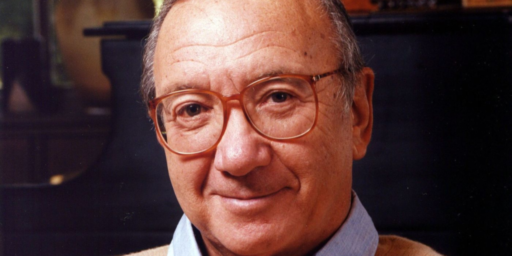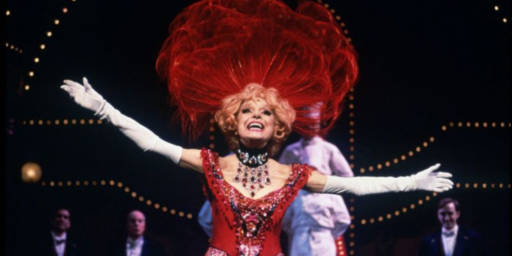Is Ben Shapiro NPR in Reverse?
Oh, FFS.

Memorandum pointed me Matt Taibbi‘s latest, “NPR’s Brilliant Self-Own.” The essence of the piece,
Yesterday’s NPR article, “Outrage As A Business Model: How Ben Shapiro Is Using Facebook To Build An Empire,” is among the more unintentionally funny efforts at media criticism in recent times.
[…]
NPR has not run a piece critical of Democrats since Christ was a boy. Moreover, much like the New York Times editorial page (but somehow worse), the public news leader’s monomaniacal focus on “race and sexuality issues” has become an industry in-joke. For at least a year especially, listening to NPR has been like being pinned in wrestling beyond the three-count. Everything is about race or gender, and you can’t make it stop.
[…]
This was functionally the same piece as the recent New York Times article, “Is the Rise of the Substack Economy Bad for Democracy?” which similarly blamed Substack for hurting “traditional news” — and, as the headline suggests, democracy itself — by being a) popular and b) financially successful, which in media terms means not losing money hand over fist. There, too, the reasons for the rise of an alternative media outlet were presented by critics as a frightening, unsolvable Scooby-Doo mystery.
It’s not. NPR sucks and is unlistenable, so people are going elsewhere. People like Shapiro are running their strategy in reverse and making fortunes doing it. One of these professional analysts has to figure this one out eventually, right?
Taibbi is a skilled polemicist and a reader unfamiliar with both Shapiro and NPR might well come away persuaded. And this section is brilliant satire:
A brief list of just a few recent NPR reports:
“Billie Eilish Says She Is Sorry After TikTok Video Shows Her Mouthing A Racist Slur.” Pop star caught on tape using the word “chink” when she was “13 or 14 years old” triggers international outrage and expenditure of U.S. national media funding.
“Black TikTok Creators Are On Strike To Protest A Lack Of Credit For Their Work.” White TikTok users dance to Nicky Minaj lyrics like, “I’m a f****** Black Barbie. Pretty face, perfect body,” kicking off “a debate about cultural appropriation on the app.”
“Geocaching While Black: Outdoor Pastime Reveals Racism And Bias.” Area man who plays GPS-based treasure hunt game requiring forays into remote places and private property describes “horrifying” experience of people asking what he’s doing.
“Broadway Is Reopening This Fall, And Every New Play Is By A Black Writer.” All seven new plays being written by black writers is “a step toward progress,” but critics “will be watching Broadway’s next moves” to make sure “momentum” continues.
“She Struggled To Reclaim Her Indigenous Name. She Hopes Others Have It Easier.” It took Cold Lake First Nations member Danita Bilozaze nine whole months to change her name to reflect her Indigenous identity.
“Tom Hanks Is A Non-Racist. It’s Time For Him To Be Anti-Racist.” Tom Hanks pushing for more widespread teaching of the Tulsa massacre doesn’t change the fact that he’s built a career playing “white men ‘doing the right thing,'” NPR complains.
That’s just hilarious.
And there’s a great deal of truth in the critique. While I don’t listen to NPR as much as I once did, with podcasting having destroyed my patience for sitting through stories that I don’t care about, the network does have a tendency to ride hobby horses to death. As a much-more-conservative listener years ago, I found their reporting on issues I cared about fair and in-depth. But they weren’t exactly subtle about inserting long feature stories on their flagship “Morning Edition” and “All Things Considered” programs that advanced a progressive viewpoint on the social issues of the day. It got to be a bit much.
Alas, a sampling of some of the linked stories reveals that Taibbi’s satirical summaries of the NPR features above, while hilarious, simply misrepresent the shows. So, for example,
“Geocaching While Black: Outdoor Pastime Reveals Racism And Bias.” Area man who plays GPS-based treasure hunt game requiring forays into remote places and private property describes “horrifying” experience of people asking what he’s doing.
just ain’t true.
[S]oon after he started, Cadd, who is Black, read a forum where people were talking about how they were rarely bothered by the police while geocaching.
“And I was thinking, man, I’ve been doing this six months and I’ve been stopped seven times.”
As a Black person, Cadd said those encounters can be terrifying.
So, while geocachers are rarely asked what they’re doing and yet Cadd was stopped seven times—by the police—soon after he started. That . . . seems like a story. Oh, and, no, he’s not going on private property.
Geocaches are not supposed to be placed in locations that require someone looking for them to trespass or pass markers that prohibit access. And by uploading the coordinates of a cache page to the geocaching app, the hider must agree that they have obtained “all necessary permissions from the landowner or land manager.”
Still, Cadd avoids certain caches — if they are hidden in the yard of private homes, for example — because he feels it could be dangerous for him.
[…]
He writes about encountering racism on the road on his blog, Geocaching While Black. He’s had some harrowing encounters, such as being called “boy” in Paris, Texas. Or finding a cache hidden inside a flagpole that was flying the Confederate flag.
There’s more to the story but you get the idea. It’s exceedingly anecdotal and the evidence is a single man’s telling of his own story. Given the blog’s titular topic and the need to continually generate content, it’s not inconceivable that it’s idiosyncratic or exaggerated. But, frankly, it seems incredibly plausible given what we know about how people perceive Black men who are in places where they’re unexpected.
That was the first of the stories I went to and I won’t deconstruct all of them but Taibbi’s take here was simply dishonest.
The story about the Black plays opening on Broadway? Yes, all seven of the new post-pandemic plays were written by Black playwrights? What more could those ungrateful, uppity people want amirite? Well, it turns out that five of them are first-timers and—you may be surprised to learn this—most shows appearing on Broadway have historically been written by whites. No, it’s true.
Five plays have already been scheduled for 2022, and none so far were written by Black writers.
“Seven Black shows coming to Broadway — it’s unprecedented. It’s what we would like to see, especially after the racial reckoning we’ve had in this society over the past year, and more specifically in the theater industry,” Shade said. “But we also have to be realistic about the placement of the shows. We have to be realistic about what this may mean for Black artists going forward.”
Oh, and
Still recovering from the latest wave of the pandemic and with the Delta variant on the rise, tourism in New York remains low. Plays — particularly new Black-written plays — face extreme pressure to be immediately financially successful, Shade said, and risk being quickly shut down and shut out if they aren’t.
So, yeah, one might forgive some trepidation as to whether a surge of Black-written plays portends a new era or is merely an anomaly.
Of the stories that I sampled, the one where Taibbi’s critique rang truest—and one that I had read previously—was the Tom Hanks piece. It is indeed absurd to criticize Hanks, seemingly universally viewed as a good guy and an ally, for making movies about good white guys. And too much of the piece seems to do that. It takes a while for it to finally get to a legitimate point:
He’s not alone. Superstar director Steven Spielberg has a similar pedigree (notwithstanding occasional projects such as The Color Purple and Amistad). And fellow director Ron Howard. These stories of white Americans smashing the Nazi war machine or riding rockets into space are important. But they often leave out how Black soldiers returned home from fighting in World War II to find they weren’t allowed to use the GI Bill to secure home loans in certain neighborhoods or were cheated out of claiming benefits at all.
They don’t describe how Black people were excluded from participating in space missions as astronauts early in America’s space program. As the book and film Hidden Figures notes, even brilliant Black and female mathematicians faced discrimination in the space program during the 1950s and 1960s. If given better opportunities, perhaps they could have helped us get to the moon sooner, by putting our best minds on the problem, regardless of race.
In some ways, Hollywood is tripped up by its own storytelling habits. Often, in modern films and TV shows, open and ugly expressions of racism are used to telegraph to the audience that a character is a terrible person. Think of the moment when a mobster in The Godfather notes he wants to focus selling hard drugs to Black people or “the coloreds” because, “they’re animals anyway, so let them lose their souls.” Our antihero, Marlon Brando’s Don Corleone, had resisted selling drugs at all, but accepts a compromise.
Once that dynamic is established, it’s tough to show a character the audience is supposed to love displaying the type of racism that was common in their time. Which means the product of that racism – from lynchings to redlining – is often disappeared, too.
This is, somewhat obliquely, an attack on structural racism more so than on Hanks or Spielberg or even Hollywood. Even well-intentioned tropes— that vulgar expression of racism is something only bad guys engage in—can unintentionally normalize more subtle forms of racism. The column, alas, falls into the op-ed trope of relying on a recent happening (in this case, an NYT op-ed by Hanks on the Tulsa massacre) as a hook to make a point the writer needed an excuse to make. So, it turns a valid critique of a system into a rather weak complaint about a person trying to be an ally.
I have neither the time nor the inclination to go through Shapiro’s recent oeuvre to compare it to these NPR stories. Indeed, scanning through the front page of his site, The Daily Wire, it appears his only regular contribution is an eponymous podcast. But I’d be surprised if the actual content of his analysis displayed anything like the subtlety of even Taibbi’s cherry-picked examples.






I listen to All Things Considered (the first :30) on my drive home. I haven’t been hearing any of those stories.
First and foremost is COVID. Then Congress & the President. There’s a fair bit about Palestine/Israel conflict. Other headline-type stuff. Deaths of people I’ve never heard of (like a telenovela writer). Etc.
I came across the black geocaching guy on a podcast. Taibbi, who I used to find entertaining, is full of it.
@Teve:
For whatever reason, he’s joined the ranks of Glenn Greenwald in terms making contrarianism a brand.
I have no idea what happened to Taibbi.
There was a time when I enjoyed reading him. That was a long time ago.
I rea this story, and I would like to ask Matt Taibbi why he thinks it is so inconsequential and ridiculous. His summary isn’t really misrepresenting the story, it just comes across as a case where an entitled, arrogant prick thinks that historical genocide isn’t that big a deal. Why the hell is this woman whining about the past?
It is interesting that all the stories cited touch on race in some way. How dare those people complain! Let’s all go to Ben Shapiro’s site where we can whine about how tough it is to be a white male.
@senyordave: This was the story I was talking about:
“She Struggled To Reclaim Her Indigenous Name. She Hopes Others Have It Easier.”
Taibbi is the 21st century’s P.J. O’Rourke. Remember him? Is he still alive?
@Not the IT Dept.:
Yes. Ironically he’s a panelist on NPR’s “Wait,Wait Don’t Tell Me” occasionally.
Taibbi cut his reporting teeth in Russia, reporting for a number of different media outlets at different times. Something in that experience caused him to go full denial mode on the whole Trump/Russia issue, and he’s been unreadable since them. It’s a damn shame.
@Not the IT Dept.:
O’Rourke is still alive and living in New Hampshire.
Ok, have you learned your lesson? Taibbi just isn’t an even semi-reliable journalist these days. He used to be quite good, but then something broke in him. In the Trump Era he just stopped being honest-but-biased, decided that the one thing worse than Trump was people criticizing Trump and found a new career in being an anti-anti-Trumper.
But, really, have you learned your lesson? Are you going to skip over his articles in the future?
People are not well equipped to handle false information, even when they know it might be false. If it strikes an emotional response, it sticks around and you forget where you learned it and how false it is. It pollutes the mind.
It’s not hard to dishonestly mischaracterize a story, be it news or fiction.
The Wizard of Oz: a girl kills a woman, then teams up with three adults to kill the woman’s sister.
Jaws: a magnificent shark is hunted down after it tries to feed itself.
Nightfall: people destroy the world during a solar eclipse.
Star Wars Episode IV: terrorists destroy an Imperial peacekeeping station.
1984: by the graces of Big Brother, two mentally ill outer party members receive the help they need.
I’ve long considered Matt Taibbi to be too much heat and not enough light.
In contrast, Ben Shapiro is a know-it-all who actually knows nothing. Dude claimed that if it doesn’t have a melody it isn’t music. Which makes him an incurious, unimaginative idiot. I mean, you’ve heard of drum lines? Percussion ensembles? Debussy’s La Mer, or John Luther Adams’ Become Ocean? I guess not.
So, Taibbi is better than that, he just chooses to be a jackass because he makes more money that way. That’s what he cares about. That’s why he’s comparing Ben Shapiro to NPR.
Now, there’s a part of me that wants to be fair, and to recognize that money is really, really hard to come by in the journalism business these days. That doesn’t mean I want to read him, though.
@Kathy: off topic, but it reminds me a of a tweet (that’s now set on private) from Adam Shaftoe about a review his wife wrote about Alien:
Alien is a movie where nobody listens to the smart woman, and then they all die except for the smart woman and her cat. Four stars.”.
@mistermix:
I honestly think he was always like that. Its just easier to miss when you’re reporting under a totalitarian regime.
I also suspect that he’s the type of arch progressive that also thinks everything boils down to class and that race prevents us from seeing that (this also includes folks like the odeus Michael Tracey).
Also, color me surprised that the person who decided to write a novel called “The Business Secrets of Drug Dealing: Adventures of the Unidentified Black Male” might have a some “complicated” feelings about race.
@Kathy: someone joked, “from Jabba’s POV, Star Wars is about lending a scuzzball money, and instead of paying you back, he gets his friends to murder you.” 😛
@Kathy: CAA on line one. Asks if you can make a pitch meeting this Thursday.
@Mike in Arlington:
So many people overlook the cat.
@Teve:
One time I tried to do one or two line synopses of science fiction stories that would describe the gist of the story, but without any spoilers. The necessity to omit the context made them rather inaccurate, uninformative, or misleading.
I recall a few:
Franchise by Isaac Asimov: A man gets to vote.
The Mote in God’s Eye by Niven and Pournelle: First contact takes place peacefully in the far future.
Ringworld by Larry Niven: two humans and two aliens explore an ancient artifact.
2001 by Arthur C. Clarke: The ship’s computer malfunctions on a mission to Jupiter (or was it Saturn?)
Foundation by Isaac Asimov: Implementing a complicated mathematical theory.
Or how about this for a short, misleading synopsis of World War I: Germany looks for its place in the sun.
Back when I was a conservative, NPR grated on me.
Today when I am a liberal, it grates even more.
I guess partly because it always adopts the tone of privileged white sanctimony, like the sort of people who have BLM bumper stickers on the car they drive to drop their kids off at a whites only private school.
Maybe I’m being unfair, but the tone comes from the way NPR always uses the subtle markers of class distinction- the classical or jazz bumper music, the casual references to high art and literature- it clearly is aimed as a very privileged and affluent market (or those, like college students, who aspire to be) and mixed with the focus on social justice themes tends to highlight the complicity of their market audience with the very injustices they decry.
@Chip Daniels:
Can we do lunch on Friday?
Like Greenwald, Taibbi has joined the cult of anti-anti-Trumpism.
@Chip Daniels:
Yep. NPR is for the smug at heart.
@Stormy Dragon:
At least PJ would announce he was a conservative and proudly so, but more importantly, he could be genuinely funny. Taibbi, not so much.
@mistermix: during his years in Russia, he and his partner took the opportunity to regularly sexually harass and assault Russian women, because the women had no power to do anything about it. And they bragged about it. After I learned if this, I stopped reading anything by Taibbi.
As MR has pointed out regarding Trump, given this history, who knows what kompromat Putin has on Taibbi from that time.
@Chip Daniels:
What’s the alternative to NPR?
@Kathy: Close Encounters Of The Third Kind: Richard Dreyfus goes to great lengths to abandon his family.
Waiting For Godot: A modern parable to the experience of schoolchildren reading the Iliad for the Trojan Horse.
ET: Immigrant treated poorly by the government self-deports.
Avatar: It’s just furries.
@Stormy Dragon:
The BBC.
@Michael Reynolds:
The only OTA version of the BBC around here IS NPR.
@Stormy Dragon:
It’s also kinda weird to suggest NPR is bad because it represents white liberal smugness and then suggest The BBC as an alternative.
@Michael Reynolds:
It’s hard to listen to “Wait, Wait, Don’t Tell Me!” and not eventually come to the realization that this is why conservatives hate us.
I like the show, but it’s just about the smuggest thing that has ever been created (Bill Maher might be more smug, and Shapiro definitely is, but “WWDTM” is the smuggest, not-evil thing…)
(“Fresh Air”, however, is wonderful, and “This American Life” is more bemused than smug)
2 Fast 2 Furious: automobile enthusiasts perform community service.
How anything else can be called smug, by people who’ve seen Sean Hannity’s face, is amazing.
If the racist, science-denying Deliberate Covid Vectors want to complain that I’m smug, I think I just may be able to live with that.
@Teve: The smug liberal trope goes back at least to the ’60s and is part of the giant propaganda project the conservative movement used to resurrect itself and to distract people from the fact they’re wrong about everything and that they’d never win office if they were honest about their agenda. The key is that it’s a pure ad hominem: when people attack liberals as smug they’re not engaging with any of the ideas liberals put forth, but simply trying to make them sound unlikable–as if that even mattered if it were true. And it doesn’t help that Democratic politicians are forced to shut up about the obvious truth that a lot of people vote Republican because they’re just plain dumb, or more generously, uninformed and easily manipulated. When Obama said that line about voters clinging to their guns and religion, it was the ultimate Kinsley gaffe because it was something that was true but was the last thing that was smart for a politician to acknowledge–particularly from a party that was bleeding support from what was once its traditional base.
I drive a fair amount. I listen to the radio. I can only take so much sports radio. Dont do music much. Doesnt leave a lot else so I go back and forth from NPR to sports radio. Some of the in depth reporting on NPR is still pretty good. There is definitely more gay, trans, people of colors stories but that is not all they cover.
Steve
Gotta tell you, I’ve cringed at a lot of NPR programming but, Ben Shapiro is as insufferable as any NPR Apparatchik. Yes, perhaps more so that Michael Krasny out here in the Bay Area (okay, maybe I went too far there).
To me Ben Shapiro is a conservative’s idea of what a young intellectual looks like and really is. He’s a more earnest and serious version of Tucker Carlson or Charlie Kirk, and to conservatives that means he seems to be an intellectual.